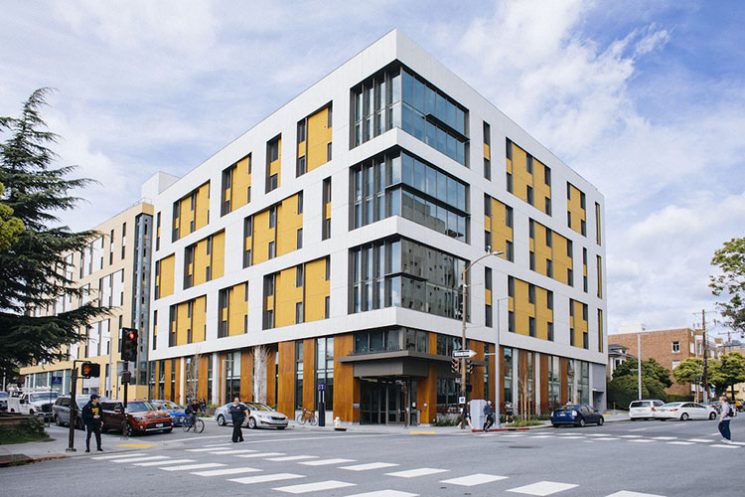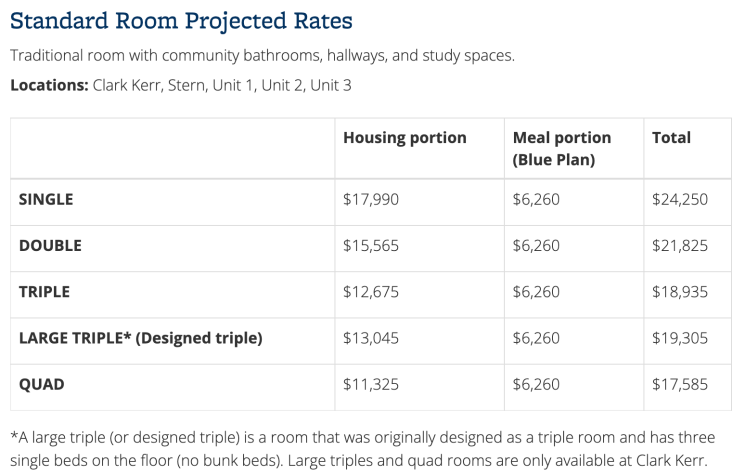
By Kevin Sears
You’ve slaved away for the past four years to accomplish one goal: get into the University of California (UC), Berkeley. As a sophomore, UC Berkeley first appeared on your radar when your parents asked you a classic question: “Where do you want to go to college?”
Having never considered the question thoroughly, many would google “Top Ranked Universities of California,” and it appears the US News ranks Berkeley as the number one public university. However, before diving into the US News rankings for the best schools in the US, seniors should first assess a university’s accessibility to housing.
UC Berkeley, which has a student population exceeding 45,000, accommodates only 23% of its students in campus housing. Moreover, the city of Berkeley, California, where the university is located, has a cost of living that is 77% higher than the national average. This contributes to more than 10% of the students experiencing homelessness.
“[UC Berkeley] should be providing affordable housing for the people that they admit. They don’t always provide housing in general, so they are pretty far off from this ideal. Some of my friends have spent periods of time couch surfing,” UC Berkeley senior Trey Livian said.
Despite these challenges, the university’s enrollment continues to grow, showing a four percent annual increase and an addition of 14,565 new students in Fall 2023.
If you were one of the newly enrolled 14,565 students, how accessible would housing be to you?
Although living on campus is not mandatory for freshmen at UC Berkeley, more than 95% of freshmen have taken advantage of the university’s one-year guaranteed housing in recent years. These students generally have to be flexible and satisfied with “any room size” and “any location.” Typically, freshmen are housed in a triple share with two other roommates, and although the housing is guaranteed, it won’t be free.

To accommodate for the expensive housing, nearly 70% of undergraduate students receive some form of financial aid and scholarships.
Following their freshman year, many students at UC Berkeley choose to move off-campus due to the high cost of dorm living. With 73% of students residing off-campus, the demand for housing in the surrounding city has increased. From 2011 to 2018, the monthly rent for a rent-controlled one-bedroom apartment in Berkeley increased by an average of $1,800 per month. This steep cost of living, coupled with the fact that many full-time students don’t have a regular source of income and rely on student loans, has contributed to a homelessness rate of 10% among students.
“I pay $1,350 a month for a single with communal bathrooms and showers … the place is privately rented off-campus,” Livian said.
UC Berkeley is part of a broader challenge for many University of California campuses regarding affordable housing. In 2021, across eight of the 10 UC campuses, more than 7,500 students found themselves waitlisted for on-campus housing. Furthermore, the scarcity of available housing has forced 16% of UC students into nontraditional housing arrangements, such as hotels.
Additionally, housing availability varies significantly across universities. UC Davis offers two years of guaranteed housing, UCI guaranteed housing for freshmen with a possibility of continuation and UCLA offers guaranteed housing for all four years. Although the housing is guaranteed, it won’t be free.
Since establishing its goal for 8,800 new beds in its 2017 housing goals, UC Berkeley has been actively redeveloping its campus to increase accessible housing options. In 2018, the university successfully opened Blackwell Hall, which added 900 new beds for undergraduates. Currently, the university is committed to three other developments that are projected to add 2,600 new beds.
However, UC Berkeley’s current housing development plans at People’s Park have met considerable opposition from both locals and students. This park has become a historical site, known for its protests against the Vietnam War and in support of civil rights, becoming a symbol of community activism. Many argue that the building housing upon People’s Park would undermine the historical significance of People’s Park.
The situation at People’s Park has become an intersection between university expansion, community concerns and legal constraints. Construction has been delayed due to court orders, with the opposing counsel arguing that the future noise caused by college students is a form of pollution. UC Berkeley, already grappling with a housing shortage, has been placed in a stressful situation where its strategies to address the housing crisis come in conflict with local and environmental interests.
Looking back at Fountain Valley High School, 29% of students are low-income, and 52% of surveyed seniors have plans to attend a four-year university. Since higher education has long been proven a gateway towards social mobility, low-income students need to consider housing availability before choosing their college.





